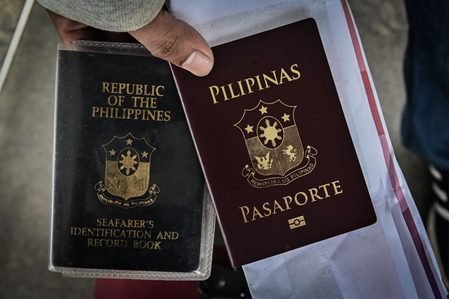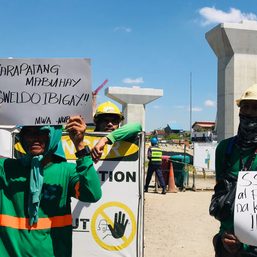SUMMARY
This is AI generated summarization, which may have errors. For context, always refer to the full article.
![[ANALYSIS] Number of jobless Pinoy seafarers to rise over faulty labor dispute process](https://www.rappler.com/tachyon/2023/04/tl-jobless-ph-seafarers-1.jpg)
The Philippines is known as the world’s top supplier of seafarers, and over the years, foreign employers tended to favor Filipino seafarers over those from other nations. As a result, Filipino seafarers working overseas have helped boost the Philippine economy by becoming a major source of foreign exchange remittances.
However, this favorable state of affairs could be soon coming to an end. Reason: foreign employers feel that they are getting the short end of the stick whenever labor disputes over disability claims arise between them and the Filipino seafarers that they have hired. These employers end up paying the monetary awards to seafarers whenever the country’s labor courts rule in the latter’s favor, even if the decisions are later reversed after they are found to be faulty by the appellate courts.
A study of the global maritime industry by the United Nations Conference on Trade and Development confirms the Philippines’ top ranking among countries providing seafarers. UNCTAD estimated that 385,000 Filipino seafarers were deployed overseas, making up more than a quarter of the global shipping labor force.
As a result, the study said, in 2019, these seafarers contributed $6.5 billion or a hefty 21.5% of the $30.1 billion in total annual remittances of overseas Filipino workers for that year.
But foreign employers have been losing hefty sums of money over labor disputes with Filipino seafarers. The Association of Licensed Manning Agencies (ALMA) Maritime Group, an umbrella organization of more than 50 crewing agencies deploying Filipino seafarers, has revealed that from 2018 to 2022, foreign employers of Filipino seafarers had to pay a whopping P2.57 billion in monetary claims granted by labor courts to the seafarers even after these were later reversed by the appellate courts.
Since labor court decisions are executed regardless of the petitions for judicial review filed by employers before the appellate courts, employers must pay the monetary awards to the seafarer first, and may only recover the amount or bear the loss when such decisions are later reversed by the appellate courts.
Under Presidential Decree 442, the Philippine Labor Code, as amended by Republic Act 6715, the Herrera Law, and under rules and guidelines on labor arbitration, arbiters of the National Labor Relations Commission and the National Conciliation and Mediation Board – collectively called labor courts – are authorized to issue rulings on monetary disputes between seafarers and their employers. These rulings were once subject to appeal before the Philippine Labor Secretary, but Presidential Decree 1391, an amendment to the Labor Code aiming to ensure speedy labor justice and further stabilize industrial peace, abolished this.
Under the Rules of Court and as established in St. Martin Funeral Home v. National Labor Relations Commission and B. Aricayos, G.R. No. 130866 (1998), the Court of Appeals and the Supreme Court – collectively called the appellate courts – may review and, if necessary, reverse the labor courts’ rulings on seafarers’ complaints. This can take place after the filing of petitions for certiorari before the appellate courts. However, the labor courts’ rulings become final and executory after prescriptive periods lapse, regardless of the results of the petitions filed with the appellate courts.
A significant number of these cases – reportedly amounting to P2.57 billion in monetary awards from 2018-2022 – are reversed on the grounds of grave abuse of discretion, meaning, an exercise of judgment by the labor courts that is found by the appellate courts to be capricious and whimsical.
As a result, foreign employers are now increasingly bypassing Filipino seafarers. Unless this trend is reversed, unemployment among seafarers will rise and remittances from them will fall, thereby negatively impacting the country’s economy.
Is there a way to nip this burgeoning problem in the bud? There is. Legislators are proposing the inclusion of an escrow provision in House Bill 7325, the Magna Carta of Filipino Seafarers, which the House of Representatives passed upon third and final reading last March 6. This bill aims to protect the rights of seafarers before, during, and after deployment, and develop a pool of competent and world-class seafarers through a system of education, training, and licensing.
Under the escrow provision, in cases where employers seek judicial review from appellate courts, the disputed monetary awards granted by labor courts to seafarers will be placed in the hands of a third party until after the appellate courts have completed their judicial review and decided on whether to uphold, modify, or reverse the decisions of the labor courts.
Meantime, the affected seafarers may opt to post a bond to avoid escrow and execute on the award pending completion of the judicial review.
Critics have questioned the constitutionality of such escrow provision for apparently violating the principles of equal protection of the laws and full protection to labor as stated in the Philippine Constitution:
Section 1, Article III, Bill of Rights: No person shall be denied equal protection of the laws.
Section 3, Article XIII, Social Justice and Human Rights: The State shall afford full protection to labor, local and overseas, organized and unorganized.
The application of these principles to the present issue, however, must be studied with sobriety.
Equal protection – in concrete terms – means that, first, a substantial distinction must exist between 1) domestic or foreign land-based Filipino laborers and 2) Filipino seafarers who are contractually employed aboard foreign vessels by foreign principals, paid in foreign currency, and covered by international protection and indemnity insurance; second, the provision for escrow applies only to disputed monetary awards; third, this provision will apply to all seafarers in similar situations; and fourth, this provision will apply to all parties covered by the rule.
Further, the Supreme Court in interpreting the Labor Code and the constitutional commitment to the policy of social justice, has stated that in protecting the rights of the workers, the law does not authorize the oppression or self-destruction of employers (Imasen Philippine Manufacturing Corp., v. Alcon, G.R. No. 194884 [2014]). Judicious interpretation of laws must balance conflicting rights and not indiscriminately favor one party at all times at the expense of another.
To compromise the country’s position as the world’s leading source of seafarers is to compromise its economy. While the issue of seafarers’ monetary claims is a complex one involving both foreign and local laws, contracts, and personalities, the escrow provision as proposed is a much-needed stopgap measure. It hurdles the test of constitutionality, gives the seafarer the option to forego escrow and execute judgment pending appeal, and might just be the means to avoid monetary losses of employers due to reversed decisions of labor courts by appellate courts and the resulting rise in unemployment among seafarers. – Rappler.com
Zara Marie Dy has been specializing in labor and maritime law since 2017 and is a moderator of ISIP-ISAK, an online biweekly forum of the Institute for Studies in Asian Church and Culture (ISACC).
Add a comment
How does this make you feel?



![[Episodes] Fairness to freelancers](https://www.rappler.com/tachyon/2024/02/Freelance-Writers-Guild-of-the-Philippines-rate-guide.jpg?resize=257%2C257&crop=217px%2C0px%2C720px%2C720px)


There are no comments yet. Add your comment to start the conversation.